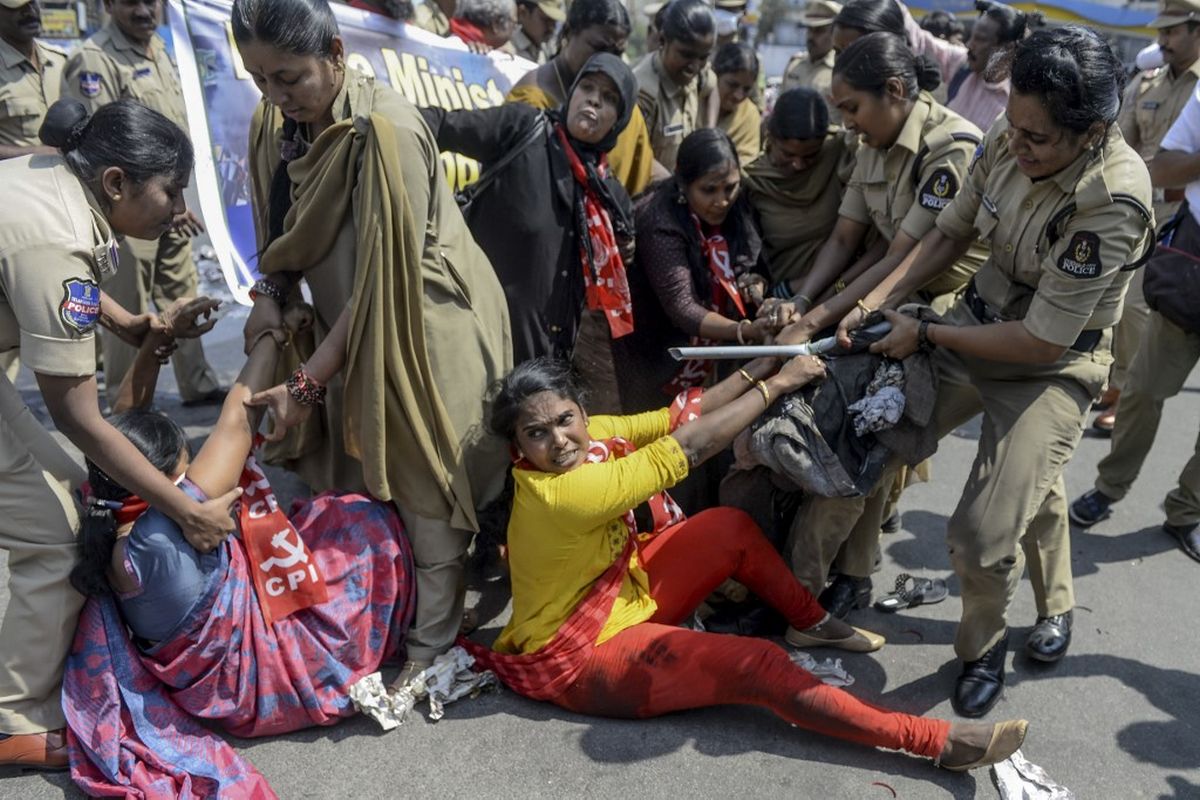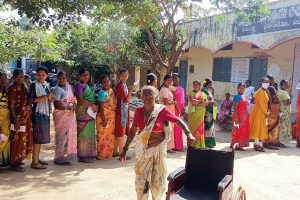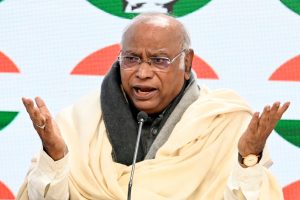Post-colonial India witnessed three mass movements cutting across party lines. The first was the JP movement launched by Jayaprakash Narayan against the autocratic rule of Indira Gandhi leading to the imposition of the Emergency of 1975-77. It culminated in the collapse of the Congress party’s monopoly of power and saw the birth of the shortlived Janata Party. The second was the Jan Lokpal movement of 2011 led by Anna Hazare against endemic corruption in high places.
Begun at his village of Ralegaon-Siddhi in Maharashtra, it spread like wildfire across the country. People from all walks of life without any political affiliation organised sit-in protests in their respective towns and villages. It paved the way for, among other things, entry of a band of young people committed to provide corruption-free governance, to enter politics. Arvind Kejriwal of AAP is a product of that movement. Its ramifications for the Congress and the United Progressive Alliance it led was immense.
In the first Lok Sabha election after the anti-corruption crusade in 2014, the Congress was reduced to the level of regional parties and it fared no better in 2019. It can be said the Anna movement against corruption spelt the death knell of the Congress as the premier political party in the country. The time for its requiem is not far off unless the party reinvents itself under a leadership shorn of dynastic claims. Unlike the first two, the third mass movement has no leaders. It is a spontaneous uprising of the student community, the youth of the nation and predominantly women against the hurriedly passed, ill-conceived Citizenship (Amendment) Act, 2019.
It is patently anti-Muslim and flies in the face of everything Mahatma Gandhi stood for, contrary to claims of Prime Minister Narendra Modi and Union Home Minister Amit Shah. Apart from excluding Muslims from the purview of the impugned Act, it differentiates between the specified class of illegal immigrants based on when they entered India and where they live. Provisions of CAA are not applicable to the Sixth Schedule and the Inner Line Permit areas. It was passed by both Houses of Parliament in record time and the President’s assent obtained in double-quick time. Events have shown that the enactment is dangerously divisive, and the CAA is the forerunner to the National Citizenship Register and National Population Register which the government is committed to implement.
Once implemented, the nation could witness the largest “statelessness” crisis the world has ever witnessed. What made the students and youth of the country take up cudgels against CAA are its dangerously discriminatory clauses and potential to cause widespread human suffering. The Prime Minister and the Home Minister maintain the government brought about the amendment to the citizenship law purely to fast-track granting Indian citizenship to the persecuted minorities belonging to Hindu, Sikh, Buddhist, Jain, Parsi and Christian communities in neighbouring Pakistan, Afghanistan and Bangladesh.
Followers of Islam who constitute roughly 20 per cent of India’s population, are conspicuously left out of the purview of CAA. Rohingya Muslim refugees from neighbouring Myanmar, described by Amnesty International and United Nations as the world’s most persecuted community, are also excluded from Indian citizenship. A group of Rohingya Muslims was deported to Myanmar against all norms and violating the core principle of non-refoulement, which prevents states from sending back refugees to their home countries where they are likely to face prosecution. In fact, they are subjected to genocide in Myanmar.
What crime did the persecuted Tamil Hindus of Sri Lanka who had taken refuge in India commit that they are excluded from the provisions of CAA. The same is the case of Buddhists facing persecution in Tibet, also a neighbour of India. A large number of them have taken refuge in India for nearly half a century with no hope of Indian citizenship. The Modi government was faced with the unexpected problem of finding that 12 lakh people out of the 19 lakh people of Assam who could not make it to the final National Register of Citizens were Hindus.
With the CAA coming into force with effect from 10 January, these 12 lakh Hindus have been made eligible to apply for Indian citizenship, but not the six lakh Muslims. The remaining one lakh belong to tribal communities. Since the BJP government came to power in 2014, 2,838 refugees from Pakistan, 914 from Afghanistan and 172 from Bangladesh were granted Indian citizenship before CAA came into force, among them 566 were Muslims, according to Home Ministry data. No political party stood in the way of the BJP government granting citizenship to any refugee. Preventing Muslims gaining Indian citizenship seems to be the central feature of CAA.
The parent Indian Citizenship Act passed in 1955 and subsequent amendments till the latest one were religion-neutral. The 1950 Nehru-Liaquat Ali agreement says, “The governments of India and Pakistan solemnly agree that each shall ensure to the minorities throughout its territory complete equality of its citizenship irrespective of religion.” Just because Pakistan failed to keep its pledge, should India follow suit? Whereas Pakistan adopted theocracy, India chose liberal secular democracy.
The CAA spells out the group of migrants eligible for Indian citizenship and reduces the period of stay in the country from 11 years to five years for the naturalisation process. By excluding Muslims, the world’s second largest religious community who have been rulers of undivided India for more than a millennium, the communal agenda is exposed. Under the BJP’s scheme of things, CAA was to be followed by National Citizens Register and National Population Register. Notwithstanding the Prime Minister’s denial that the NCR was not considered officially even once by his government, the address of President Ram Nath Kovind to the joint session of Parliament reveals a different reality.
While Article 14 of the Constitution guarantees equality before law, Article 15 prohibits discrimination on grounds of religion, race, caste, sex or place of birth. A law that incorporates religion as the basis for obtaining citizenship would appear to violate the fundamentals of the Constitution. CAA not only excludes Muslims, but also Tamil Hindus from Sri Lanka, Bhutanese Christians and Tibetan Buddhists who too deserve a fair treatment in their quest for Indian citizenship. Even after its rout in the Delhi election in spite of its highpitched campaign, the BJP is in no mood for a course correction.
The Prime Minister said in Varanasi on 16 February, “We remain firm on CAA.” The CAA will only entrench discrimination against Muslims who were integral in the fight against colonial rule. A sense of insecurity pervades the Muslim community throughout the nation. Five State Assemblies have passed resolutions against CAA and few other States are preparing to do likewise. In Hyderabad, more than 1,000 people of Islamic faith living in the city for generations have been served notice to produce proof of their citizenship by the Unique Identification Authority of India.
The BJP and the Sangh Parivar are clear on their desideratum, Hindurashtra. The levers of government are geared to achieve this goal. Hence the continuous hate campaign and marginalisation of Muslims, even disenfranchisement wherever possible. Slogans like Goli maaron gaddaron ko by a Union minister never received the condemnation it deserved from the Prime Minister. The courts, even while reciting the Constitution, are unable to take definitive positions unfettered by governmental disposition.
A free and fair judicial process is what the Constitution promises. The Supreme Court, as the custodian of the Constitution and protector of our fundamental rights, should have decided by now the constitutional validity of CAA instead of waiting for more writ petitions, considering the growing number of agitations and the prevailing culture of fear, hate and vengeance that has overtaken the country. The Chief Justice says petitions will be heard only after the people stop violence. Que Sera, Sera.
(The writer is a veteran journalist and founder Director of the Statesman Print Journalism School)










